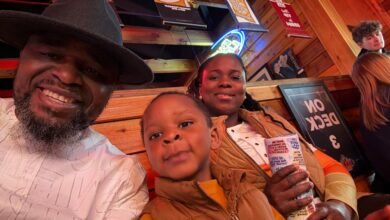
PREFACE
This is a Long Read, But I Promise, It’s Worth Your Precious Time…
There are many things in life that carry the tag, “Easier said than done.” One of them is choosing to lead a countercultural revolution, especially when it comes to raising children. But I am convinced, now more than ever, that some risks are worth taking.
As Scripture says, “Each one’s work will become clear; for the Day will declare it, because it will be revealed by fire; and the fire will test each one’s work, of what sort it is” (1 Corinthians 3:13, NKJV). Parenting choices are one such work. Our actions today will be tested by time. That is why I have chosen to speak boldly on a subject that has been misrepresented for too long: the beating of children in the name of discipline.
If you’ve followed my journey, you’ll know that I endured physical, emotional, and sexual abuse as a child. I reached adulthood at 18, not as a whole person, but as a shadow of myself. Though my age had changed, my mental and emotional development had stalled. Abuse had robbed me of the chance to grow into my personhood.
Defining the Child’s Personhood
From deep personal reflection and extensive study, especially through Scripture, I came to understand that every child is a person with four core attributes. These attributes are not earned by age or performance; they are endowed by divine design. Children do not attain personhood by growing older, they possess it from conception, because God has no grandchildren. Children and adults alike are God’s children, equal before God and the law.
Our roles are only different: children are preparing for the next phase of life, while adults provide guidance because we have entered that phase. This distinction does not make adults superior or children inferior. What we possess over our children is authority, not dominion. God did not give humans dominion over fellow humans, only over the rest of creation (Genesis 1:26). Dominion over people, including children, is a distortion of God’s mandate.
The purpose of our authority, therefore, is not to oppress but to guide, not to crush but to cultivate. And this authority is transient, it is meant to prepare children to exercise authority over their own lives.
From deep personal reflection and extensive studies, especially through Scripture, I came to understand that every child is a person with four core attributes:
✅Intrinsic Worth: Made in the image and likeness of God (Genesis 1:26–27).
✅Reasoning Capacity: Able to think, reflect, and exercise judgment. “Come now, and let us reason together,” says the Lord (Isaiah 1:18). If God invites us to reason, it acknowledges that we are reasoning beings.
✅Power of Choice: Endowed with free will and the capacity to make decisions. “I have set before you life and death, blessing and cursing; therefore, choose life, that both you and your descendants may live” (Deuteronomy 30:19).
✅Strength of Responsibility: A seed of leadership resides in every child. “Even a child is known by his deeds, whether what he does is pure and right” (Proverbs 20:11). This affirms that children bear responsibility and can exhibit leadership qualities through their actions.
When these attributes are undeveloped, whether by abuse or indulgence, the child’s mental age is stunted. Abuse attacks these qualities; indulgence neglects them. But both paths lead to the same tragic end: a lost destiny.
Children are not always aware of the consequences of their actions. Worse, even when they are aware, they often hold the illusion that those consequences will never come. That is why I say: face the temptation of indulgence and the illusion of consequence. It is our job, not to terrorize them into submission, but to guide them with truth and example.
The Lie of Beating as Discipline
I began to ask hard questions: Could my parents have done better? Was the way I was raised truly the way of discipline? Scripture answered me, not with condemnation, but with revelation. “Fathers, do not provoke your children to wrath, but bring them up in the training and admonition of the Lord” (Ephesians 6:4).
Discipline, I learned, is not punishment. It is not violence. The Latin root of the word, disciplina, means to teach, to instruct. It is formative, not punitive. Beating is not teaching. Spanking is not training. There is no such thing as “physical discipline” or “violent discipline”, those terms are contradictions. Violence and discipline cannot coexist.
The goal of discipline is to awaken a child to their personhood and to equip them to defend the dignity of their human essence:
✅That they are made in God’s image;
✅That they can think and judge rightly;
✅That they can choose wisely;
✅That they are destined to lead.
The Hypocrisy of Selective Discipline
Let’s be honest: children are not more erring than adults. Adults make mistakes daily, at home, in marriage, in leadership, in governance, yet no one prescribes flogging them. In civil spaces, we speak of accountability, not brutality. Globally, we campaign against capital punishment, even for capital offenses. Yet, we justify beating children who spill milk or forget homework, either ignorant of or forgetting that adults and children are equal before God and the law, and their dignity must be preserved.
When I was growing up, my father sometimes tied my hands and legs to beat me. Stripped and bound, I was reduced to something less than human. And I remember thinking, this is how we tie goats. This is how we tie chickens. So if goats were tied, and chickens were tied, and I too was tied, then what did that make me?
Some may argue that’s extreme. They say, “We’re not talking about all that. We just mean a light smack, a little spanking here and there to set them right.” But that argument collapses quickly when applied to adults. Imagine saying the same: “Just a light slap to reset your husband.” “Just a shove to correct your colleague.” No one would accept it.
Why do we shift the goalposts when it comes to children? Adults sin. Adults fall short. But no one justifies striking them. Why then is violence an acceptable tool for correcting children, human beings made in the image of God, with whom we share common humanity and personhood?
Those who conceived the idea of beating children as a form of discipline did so from a place of ignorance. They neither understood nor accepted the personhood of the child. And because children could not speak or defend themselves, they became easy targets.
As a philosopher once reasoned: a child hits a peer, we call it bullying. An adult hits an adult, we call it assault or abuse. But an adult hits a child, and we call it discipline? Where is the consistency? Why does the equation shift so drastically the moment children are involved?
Yet when adults become violent, we criticise them. We call them out, forgetting that we raised them violent.
We showed them violence as the way of resolving conflict. A child who is not raised to know and embrace his or her personhood will not embrace it in adulthood. That right there is the bane of domestic violence, and other forms of violence in our societies.
The Formative Years and the Power of Example
The early years are not years of correction, they are years of construction. Between birth and age six, a child’s foundational identity is laid. They do not respond to brutality, they respond to values, modeled and repeated. If they are to learn respect, they must see it. If they are to learn self-control, they must see it.
I keep saying that children have five basic developmental needs:
✅Someone to Believe In: consistent role model.
✅Something to Believe: values that shape worldview and behavior.
✅Somewhere to Belong: a friendly, nurturing, non-toxic environment both at home and in society.
✅Freedom to Express Their Being: the liberty to voice their thoughts and essence, entrenching in them an understanding that childhood is not slavery. It is a sacred phase of preparation, not a time to strip a child of dignity and agency under the pretense of discipline.
✅Something to Become: the encouragement of human ingenuity and imagination, recognizing that children are limitless in creative potential.
When the first four are adequately provided, the fifth, self-actualization, naturally follows. And the fifth is the foundational truth: childhood is not a burden to society. It is not a defect to be beaten into shape. It is a divine phase of becoming.
I use the acronym CHILDREN to define my philosophy:
C – Created in God’s image
H – Heirs of a divine purpose
I – Imitators by design
L – Learners through example
D – Delightful beings
R – Reasoners in training
E – Esteemed members of humanity
N – Noble in potential
Nothing justifies dehumanizing a child. Even pets in some homes are treated with more regard. But children are not pets, they are people. And they are watching us.
Scripture says, “Train up a child in the way he should go, and when he is old, he will not depart from it” (Proverbs 22:6). The challenge many adults face is that we want immediate results, but the Bible is clear: it is when he is old that the fruits will manifest. We are not meant to obsess over behavior in the moment—we are meant to be intentional about the seeds we are sowing.
Even when children seem not to grasp our values, because they are still navigating the illusion of consequence and the temptation of indulgence, the seeds are still being sown. You may not see the fruit, but you will see traits. And that is enough. Keep sowing.
Paul’s reflection in 1 Corinthians 13:11 reminds us of the developmental nature of childhood: “When I was a child, I spoke as a child, I understood as a child, I thought as a child; but when I became a man, I put away childish things.” Children will be childish, that is their right. Our responsibility is not to punish their immaturity, but to model maturity.
Here is the tragedy: we waste those formative years on so-called disciplinary measures instead of focusing on the real task, inculcating values through example.
What Scripture Really Teaches
When Proverbs says, “He who spares the rod hates his son, but he who loves him disciplines him promptly” (Proverbs 13:24), we must understand the term “rod” in its full cultural and linguistic context. The rod was a shepherd’s staff, used more for guiding than striking. David writes, “Your rod and Your staff, they comfort me” (Psalm 23:4). The rod comforts, not harms. It is not an instrument of abuse, but of redirection and protection.
Yes, God disciplines those He loves, but His discipline never dehumanizes. “For whom the Lord loves He chastens, and scourges every son whom He receives” (Hebrews 12:6). Yet even in chastening, God does not strip us of our dignity. He corrects, but never condemns. He instructs, but never violates our personhood. Any form of discipline that attacks a child’s dignity is not divine, it is distortion.
A Risk Worth Taking
Before our son was born. after 15 years of marriage, I made a vow: I will not beat my child. Today, as I raise him in my mid-fifties, now 3 years and 8 months old, that vow remains intact. We talk. We reflect. We guide. We affirm values.
It’s not been easy. The wiring of my upbringing makes this countercultural path difficult. But it has been worth every moment.
Time will tell. And for me, this is a risk worth taking.
What risks are you willing to take to preserve a child’s personhood?
Do have an INSPiRED week ahead with the family



